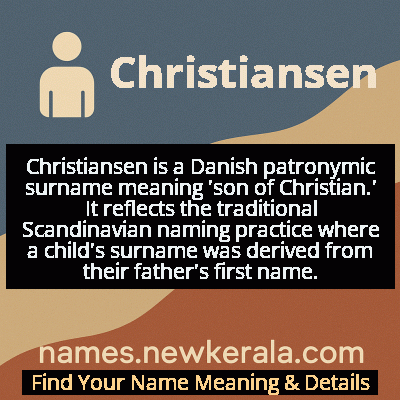Christiansen Name Meaning & Details
Origin, Popularity, Numerology Analysis & Name Meaning of Christiansen
Discover the origin, meaning, and cultural significance of the name CHRISTIANSEN. Delve into its historical roots and explore the lasting impact it has had on communities and traditions.
Name
Christiansen
Gender
Male
Origin
Danish
Lucky Number
4
Meaning of the Name - Christiansen
Christiansen is a Danish patronymic surname meaning 'son of Christian.' It reflects the traditional Scandinavian naming practice where a child's surname was derived from their father's first name.
Christiansen - Complete Numerology Analysis
Your Numerology Number
Based on Pythagorean Numerology System
Ruling Planet
Uranus (Rahu)
Positive Nature
Strong sense of order, loyal, practical, and disciplined.
Negative Traits
Stubborn, overly serious, rigid, and prone to feeling restricted.
Lucky Colours
Blue, gray.
Lucky Days
Saturday.
Lucky Stones
Blue sapphire.
Harmony Numbers
1, 7, 8.
Best Suited Professions
Managers, engineers, accountants, organizers.
What People Like About You
Dependability, discipline, practicality.
Famous People Named Christiansen
Thorvald Christiansen
Mathematician
Contributions to group theory and mathematics education
Jens Christian Christiansen
Military Officer
Danish Minister of War and military reforms
Hans Christiansen
Artist/Designer
Prominent figure in Jugendstil art movement
Lars Christiansen
Handball Player
Olympic champion and Danish sports legend
Name Variations & International Equivalents
Click on blue names to explore their detailed meanings. Gray names with will be available soon.
Cultural & Historical Significance
Extended Personality Analysis
Individuals bearing the Christiansen surname are often perceived as embodying traditional Scandinavian values of reliability, practicality, and strong family orientation. The patronymic nature of the name suggests a deep connection to heritage and lineage, often translating into personality traits that include loyalty, responsibility, and a strong sense of duty toward family and community. There's an inherent stability associated with the name, reflecting the Scandinavian cultural emphasis on egalitarianism, cooperation, and social responsibility. The Christian root of the name may also suggest moral integrity and ethical consistency in personal conduct. Many Christiansens are seen as grounded individuals who value honesty, hard work, and maintaining traditions while being open to progressive ideas. The name carries connotations of resilience and adaptability, qualities that served Scandinavian immigrants well as they established new lives in countries like the United States, Canada, and Australia while maintaining their cultural identity. This combination of traditional values with practical adaptability creates a personality profile that balances respect for heritage with forward-looking innovation.
Modern Usage & Popularity
In contemporary times, Christiansen remains one of the most common surnames in Denmark and Norway, consistently ranking among the top surnames in these countries. While traditionally a patronymic, it has become a fixed hereditary surname passed through generations. The name has spread globally through Scandinavian emigration, particularly to the United States, Canada, and Australia, where it maintains its cultural associations. Modern usage sees Christiansen as both a surname and occasionally as a given name, though the latter is less common. In recent decades, there's been a trend toward preserving such traditional Scandinavian surnames as markers of cultural identity, even as naming conventions evolve. The digital age has also seen Christiansen become a common username and online identity for people of Scandinavian descent worldwide. Despite globalization, the name continues to evoke strong connections to Nordic heritage and remains a proud identifier for millions of people of Danish and Norwegian ancestry.
Symbolic & Spiritual Meanings
Symbolically, Christiansen represents the bridge between ancient naming traditions and modern identity, embodying the continuity of family heritage across generations. The name serves as a living connection to Scandinavian ancestry and the historical transition from pagan to Christian societies in Northern Europe. It symbolizes the values of lineage, tradition, and cultural preservation while also representing adaptability through its global dispersion. The '-sen' suffix specifically symbolizes the patriarchal lineage system that dominated Scandinavian societies, while the 'Christian' root represents the religious transformation that defined medieval European history. Metaphorically, the name can be seen as representing the fusion of personal identity with collective cultural and religious heritage, serving as a reminder of how individual families carried forward both biological and cultural inheritance through centuries of social change. The name embodies the Scandinavian concept of 'folkeminne' or folk memory, connecting present generations to their ancestral past while adapting to contemporary global society.

